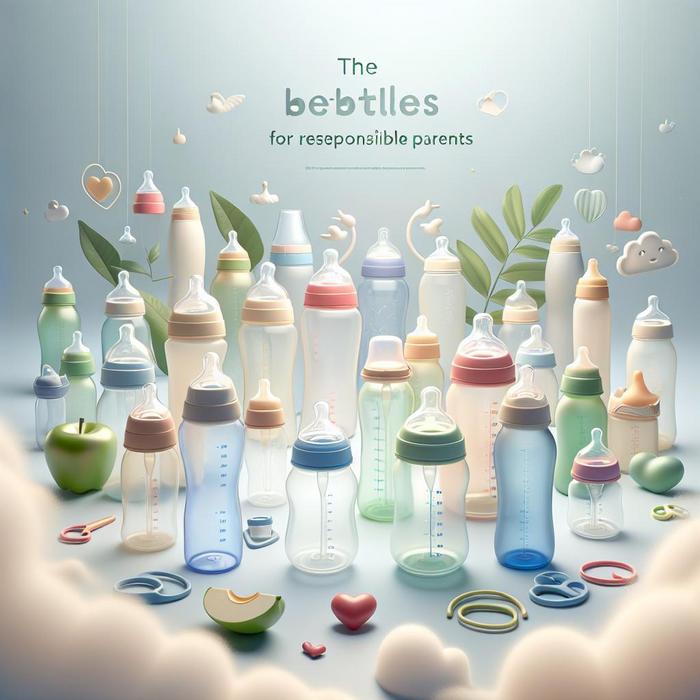The Role of the Right Bottle in Responsible Parenting
As a new parent, every choice you make for your child is crucial, including the type of feeding bottle you choose. The best bottles for parents are those that offer the utmost safety, security, and ease of use—not only for the parent but also for the baby. Parents who choose bottles that align with these parameters promote responsible feeding, which is vital for their child’s development and health.
Why Bottle Type Matters for Baby Health
Believe it or not, not all baby bottles are created equal. Some are uniquely designed to mimic mother’s breastfeeding, helping babies to transition smoothly between breastfeeding and bottle feeding. Also, certain bottles are made to reduce air intake during feeding, thus minimizing the likelihood of colic, gas, and spit-up.
Bottles for Smooth Transitioning
Take, for example, the Biomimetic Feeding Bottles. These bottles adopt the biomimetic principle, imitating the natural rhythm of breastfeeding to provide a seamless transition between breast and bottle. This feature makes them an ideal choice for parents who want to ensure their baby enjoys a smooth and stress-free feeding experience.
Bottles for Reducing Air Intake
Another noteworthy type of bottle is the vented or anti-colic bottle. These bottles feature a unique venting system that prevents air from mixing with the milk. As a result, the baby takes in less air, which greatly reduces the risk of discomfort and digestive issues.
What Makes the Best Bottles for Parents?
When it comes to choosing the best bottles for parents, there are several key factors to consider:
- Safety: The bottle material should be free from harmful substances such as BPA, PVC, and phthalates.
- Ease of Use: The bottle should be easy to hold, fill, and clean, making feeding times less of a hassle.
- Baby’s comfort: Look for bottles designed to reduce air intake during feeding to minimize risks associated with colic and gas.
- Responsible feeding: Opt for bottles that promote a smooth transition between breast and bottle feeding, like the Biomimetic Feeding Bottles.
The best bottles factor in not only the convenience of the parents but also the comfort and health of the baby. Parenting discussions at Reddit often highlight these factors as essential in responsible baby care.
The Importance of Teaching Bottle Skills
While choosing the right bottle is crucial, teaching your baby how to use their bottle is just as important. It’s not about teaching them to “bottle up” their needs; it’s about empowering them to independently meet their feeding needs over time. This process also contributes to your baby’s development, as feeding skills are an essential aspect of their growth.
Remember, the journey towards responsible feeding is a shared one between parent and baby. Your choices will inevitably shape your baby’s feeding experience and development, making it crucial to choose options that promote health, safety, and comfort.
Duty of a Responsible Parent
As a parent, providing your child with the proper tools and environment for growth is your prime responsibility. Ensuring your baby is equipped with the appropriate feeding materials—such as the best baby health bottles—can significantly contribute to their overall well-being.
Healthy Feeding Habits
Another aspect of responsible feeding, in addition to bottle choice, is establishing healthy eating patterns. To achieve this, you need to consider your feeding practices and how they impact your child’s nutritional health and eating habits. Parents who prioritize nutrition education enhance their child’s growth and overall development by fostering healthy eating habits.
The Impact of Feeding Practices
Feeding practices directly influence an infant’s intake of formula or breast milk and solid foods. The pace of introducing new foods, the family meal frequency, and the selection of meals can shape a child’s diet and their nutritional health. Therefore, responsible parenting goes beyond choosing the right bottle—it extends to how you execute feeding routines.
Benefits of Utilizing Nannies or Babysitters
Engaging the support of a nanny or a babysitter can also aid in responsible feeding practices. These professionals, contrary to associating as house cleaners, can give critical insights into child feeding behaviors and improve feeding experiences.
Understanding Your Child’s Feeding Behaviors
Being observant of your child’s feeding behaviors can offer an insightful understanding of their feeding schedule and preferences. Skilled nannies can provide a more significant impact by helping address common feeding challenges and possible improvements. Additionally, they can encourage desirable feeding behaviors, such as self-feeding and exploration of various food types and textures.
Responsible parenting doesn’t just start and end with the right feeding bottle; it encompasses a broader picture of understanding, guidance, and attentiveness to your child’s needs. Your child’s comfort, health, and overall well-being should always take precedence in every decision that you make.
Parenting as a Learning Process
Being a parent is indeed a fulfilling yet challenging role. You have to grapple with different aspects, such as understanding your baby’s needs, ensuring their health and safety, teaching them important skills, and making sure that they’re growing well. The parent’s role never stops or starts—it’s a constant journey of providing the best for your child.
Similarly, the parenthood journey is not determined by whether you breastfeed or bottle-feed. It’s about giving love, nurturing, and creating a safe and happy environment for your child to develop and thrive.
Remember, every decision—be it the right feeding bottle or your feeding practices—contributes significantly to your child’s development, health, and comfort. Being a responsible parent means making decisions mindful of these factors.
Final Thoughts
Interconnectedness of Bottle Feeding, Parenting, and Child Growth
To reinforce, choosing the right feeding bottle is a small but pivotal aspect of parenthood. So is recognizing the importance of parenting practices and their impact on your child’s growth and development. More importantly, being a responsible parent goes beyond just catering to the child’s needs—it’s about guiding and walking with them on their developmental journey, ensuring health and happiness at every step.

